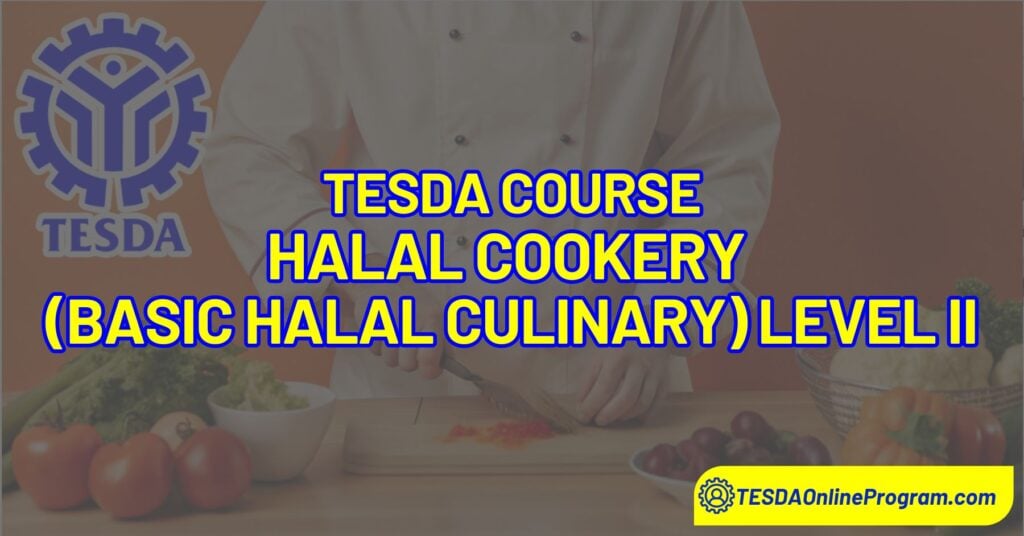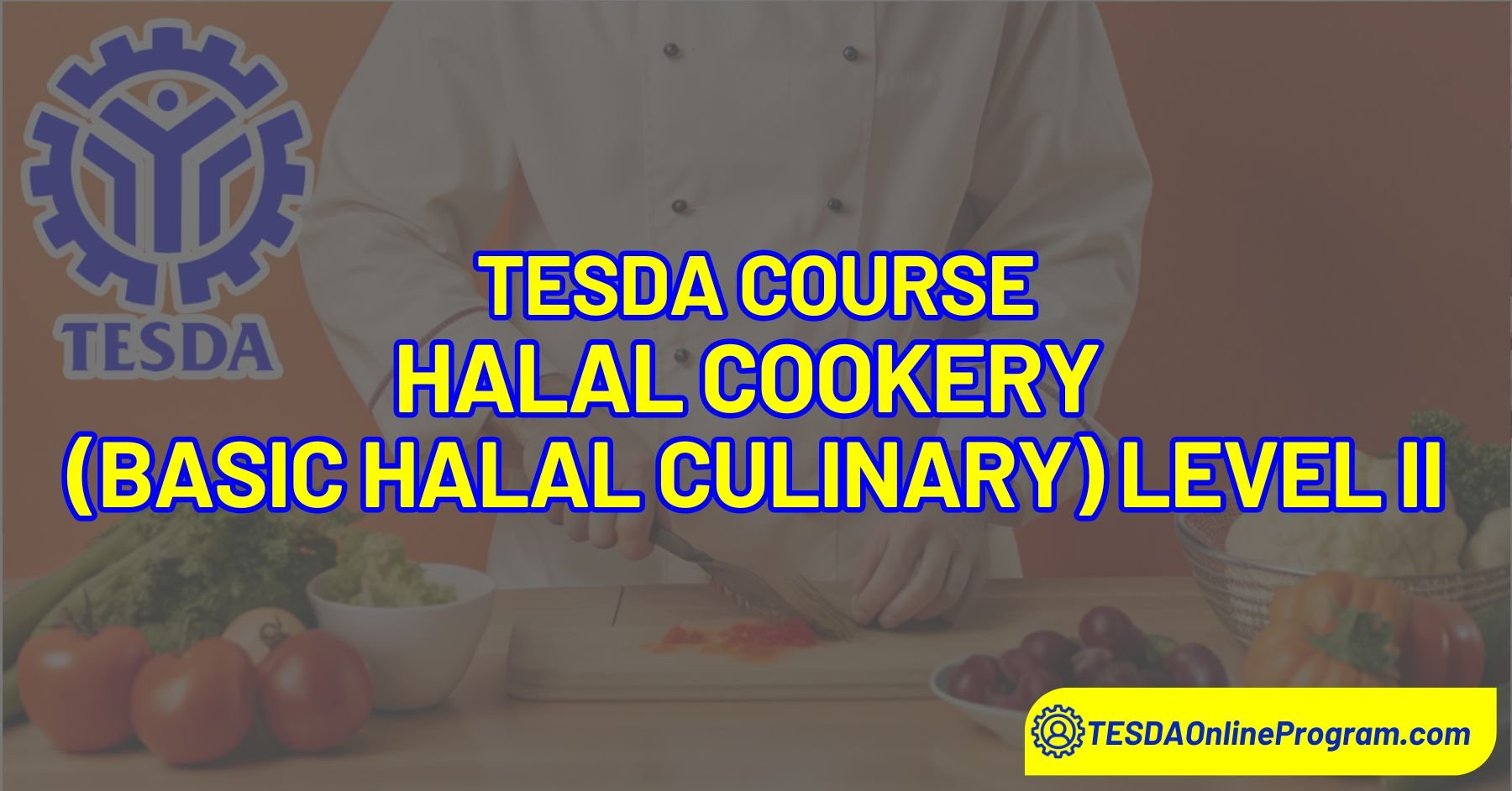The Halal Cookery (Basic Halal Culinary) Level II Course by TESDA is designed to equip individuals with the essential skills and knowledge required to prepare food in compliance with Halal standards. This program focuses on teaching the proper cleaning and maintenance of kitchen areas, the preparation of hot and cold meals, and the creation of desserts, all while adhering to Islamic dietary laws. Learners will gain a solid foundation in culinary techniques while understanding the importance of using permissible ingredients, proper handling, and food preparation methods that meet Halal requirements.
Also read: TESDA Halal Awareness Course
Through hands-on training and guided instruction, participants will be prepared to work in various food and beverage service facilities that cater to the growing demand for Halal-certified cuisine. The course not only emphasizes culinary skills but also promotes cultural awareness, food safety, and customer satisfaction. By completing this qualification, graduates can pursue opportunities in restaurants, catering services, hotels, and other establishments that offer Halal-compliant meals, contributing to the expanding global Halal food industry.

Course Description
This course trains individuals in preparing hot and cold meals, desserts, and maintaining kitchen cleanliness in accordance with Halal standards. It equips learners with basic culinary skills, proper food handling, and knowledge of Islamic dietary laws, preparing them for work in Halal-certified food and beverage establishments.
Benefits
Here are several benefits of taking the Halal Cookery (Basic Halal Culinary) Level II course by TESDA:
- Acquire essential culinary skills – Learn to prepare a variety of hot and cold meals, as well as desserts, with proper techniques.
- Gain knowledge of Halal standards – Understand and apply Islamic dietary laws in food preparation, handling, and storage.
- Improve kitchen management abilities – Develop skills in maintaining cleanliness, organization, and safety in food service areas.
- Increase employment opportunities – Qualify for jobs in Halal-certified restaurants, hotels, catering services, and food production companies.
- Tap into a growing global market – Take advantage of the rising demand for Halal-compliant cuisine locally and internationally.
- Enhance cultural competence – Learn to respect and cater to the dietary needs of diverse customers.
- Pathway to higher qualifications – Use this as a foundation for advanced culinary or specialized Halal cookery training.
Units of Competency
Here’s the list with the codes removed and presented in bullet form:
BASIC COMPETENCIES
- Participate in workplace communication
- Work in a team environment
- Solve/address general workplace problems
- Develop career and life decisions
- Contribute to workplace innovation
- Present relevant information
- Practice occupational safety and health policies and procedures
- Exercise efficient and effective sustainable practices in the workplace
- Practice entrepreneurial skills in the workplace
COMMON COMPETENCIES
- Develop and update industry knowledge
- Observe workplace hygiene procedures
- Perform computer operations
- Perform workplace and safety practices
- Provide effective customer service
CORE COMPETENCIES
- Select and prepare Halal ingredients for storage
- Maintain food safety and hygiene standards
- Prepare cold Halal dishes
- Prepare hot Halal dishes
- Prepare Halal desserts
Sample of Certificate of Completion

Job Opportunities
A person who has completed this qualification is qualified to work as:
- Halal Cook
- Halal Commis
Requirements
To enroll in this course, you will need the following documents:
- PSA Birth Certificate
- High School or College Diploma
- Certified True Copy of Official Transcript of Records or Form 137
- Certificate of Good Moral Character or GMRC
- 1 x 1 and/or 2 x 2 pictures
To obtain further details, please reach out to the enrollment site that aligns with your requirements. Kindly note that the criteria may vary.
Also read: TESDA Halal Food Processing Courses
Frequently Asked Questions (FAQ)
1. What is the Halal Cookery (Basic Halal Culinary) Level II course?
A: This TESDA program trains individuals to prepare hot and cold meals, desserts, and maintain kitchen cleanliness according to Halal standards, following Islamic dietary laws.
2. Who can enroll in this course?
A: Anyone with an interest in culinary arts and Halal food preparation can enroll, provided they meet the basic admission requirements such as educational documents and identification.
3. Do I need to be Muslim to take this course?
A: No. The course is open to all, regardless of religion. However, all training will strictly follow Halal guidelines.
4. What kind of jobs can I get after completing the course?
A: Graduates can work as a Halal Cook or Halal Commis in restaurants, hotels, catering services, or other Halal-certified food establishments.
5. Is there an assessment after the course?
A: Yes. TESDA requires a competency assessment to ensure graduates meet the required standards before certification.
6. Will I get a TESDA National Certificate after completion?
A: Yes. Successful graduates who pass the assessment will receive a National Certificate (NC II) in Halal Cookery.
7. Is this course useful for starting my own Halal food business?
A: Yes. The course includes entrepreneurial skills training, making it helpful for those who plan to start a Halal food-related business.
Summary
The Halal Cookery (Basic Halal Culinary) Level II course by TESDA equips learners with the skills and knowledge to prepare hot and cold meals, desserts, and maintain kitchen cleanliness in accordance with Halal standards and Islamic dietary laws. Through hands-on training, students gain expertise in proper food handling, kitchen management, and Halal ingredient preparation, preparing them for employment in restaurants, hotels, catering services, and other Halal-certified establishments. The program also offers entrepreneurial skills, opening opportunities for graduates to start their own Halal food businesses while meeting the growing local and global demand for Halal-compliant cuisine.

